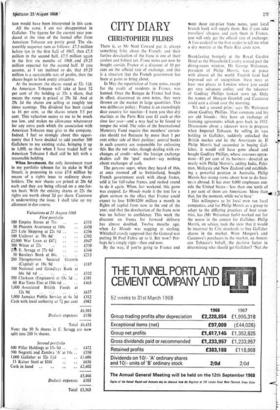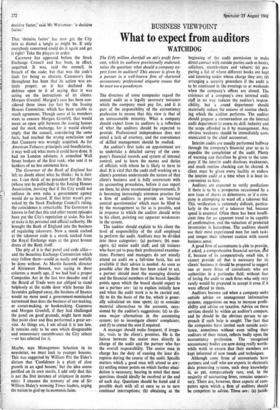CITY DIARY
CHRISTOPHER FILDES
There is, as Mr Noel Coward put it, always something fishy about the French; and their furtive devaluation of the franc is one of their coolest and fishiest yet. Franc notes can now be bought outside France at a discount of 10 per cent on the official rate of exchange, and this is a situation that the French government has been at pains to bring about.
In May the repatriation of franc notes, except for the credit of residents in France, was banned. Once the Banque de France had thus, in effect, disavowed its own notes, they were thrown on the market in large quantities. This was deliberate policy: France is an exceedingly dear country for tourists—I warn you that dry martinis at the Paris Ritz cost £1 each at this time last year—and a way had to be found to temper the wind. The rules of the International Monetary Fund require that members' curren- cies should not fluctuate by more than 1 per cent either side of their parities:. central banks in each country are responsible for enforcing this. But the IMF rules, though dealing with ex- changes of credit—what the foreign exchange dealers call the 'spot' market—say nothing about exchanges of cash.
The garcons sages, when they heard of this, at once zoomed off to Switzerland, bought French government stock with cheap francs, sold it for full-value francs, and rushed round to do it again. When, last weekend, this game was stopped, Le Monde made it the text for a glum sermon to the effect that France could expect to lose $100-$200 million a month in flights of capital from now to the end of the year, and that the devaluation of the franc note was no bolster to confidence. This week the discount on francs for forward delivery has almost doubled. Twelve months, ago, when Le Monde was nagging at sterling, Whitehall crossly supposed that the General was putting M Paul Fabra up to it. But now? Per- haps he's simply right—then and now.
By the way, if you're going to France and want these cut-price franc notes, your local branch bank will supply them. But if you take travellers' cheques and cash them in France, you will only get the official rate of exchange. A free cocktail to the first reader to tell me what a dry martini at the Paris Ritz costs now.
Breakfasting benignly at the Royal Garden Hotel as the Household Cavalry trotted past the dining-room window, Mr George Weissman, president of Philip Morris, was at peace with almost all the world. English food had improved out of recognition: there were at least two places in London where you could get very adequate coffee; and the takeover of Godfrey Phillip's looked sewn up. Only the names of Morgan Grenfell and Cazenove could cast a cloud over the morning.
`It's not a second prize,' says Mr Weissman about Godfrey Phillip. That company and his are old friends: they have an exchange of licensing agreements which goes back to 1952. Discussions about a takeover were in progress when Imperial Tobacco, by selling its vast holding in Gallaher, suddenly unlocked the British market and let the Americans in. If Philip Morris had succeeded in buying Gal- laher, it would still have gone ahead and bought Godfrey Phillips, whose overseas opera- tions-85 per cent of its business—dovetail so neatly with Philip Morris's, adding India, Paki- stan, Malaysia and New Zealand and establish- ing a powerful position in Australia, Philip Morris has strong views about how to do busi- ne,:s abroad. It has over 6,000 employees out- side the United States—gess than one tenth of 1 per cent of them are Americans. More thanlin that, for the moment, while we're here.'
This willingness to let local men run local companies, and for Philip Morris as a group to adapt to the differing practices of host coun- tries, has (Mr Weissman feels) worked out for the worse in the contest for Gallaher. Philip Morris, on advice, took the view that it would be incorrect by City standards to buy Gallaher shares in the market.. Were Morgan's and Cazenove's purchases in ,the market, on Ameri- can Tobacco's behalf,. the decisive factor in determining who should get Gallaher? 'Not the decisive factor,' said Mr Weissman : 'a decisive factor.'
That 'decisive factor' has now got the City into as dismal a tangle as might be. If only everybody concerned could do it again and get it right! Take the players in order.
Cazenove has appeared before the Stock Exchange Council and has been, in effect, acquitted. It was, said the council, in breach of the code; but that was the code's fault for being so obscure. Cazenove's line throughout has been that its action -was en- tirely proper; so it has . declined the defence open to it of saying that it was acting on the instructions of its clients. Morgan Grenfell. Morgan's case has been con- sidered three times (so far) by the Issuing Houses Committee, which has been unable to reach agreement. Though some of its members want to censure Morgan Grenfell, that -would mean an open split between the issuing houses and the stock exchange, for it would clearly imply that the council, considering the same facts, had reached the wrong conclusion and that Cazenove was wrongly acquitted. As, for American Tobacco, principals and beneficiaries, it may well ask what more it could have done. It had no London advisers; it consulted Wall Street brokers of the first rank, who sent it to bankers of no less eminence here.
The Governor of the Bank of England has left no doubt about what he thinks: he is furi: ous. I can think of no precedent for the letter (whose text he published) to the Issuing Houses Association, insisting that if the City could not 'enforce its own rules a government agency would do so instead. If that letter wasn't pro- voked by the Stock Exchange Council's ruling, the coincidence is remarkable. The Governor is known to feel that this and other recent episodes have put the City's reputation at stake. No less at stake is his personal and official authority. He brought the Bank of England into the business of regulating takeovers. Now a snook cocked• at the takeover code is a snook cocked from the Royal Exchange steps at the great bronze doors of the Bank itself.
The pity of it is that panel and code alike— and the Securities Exchange Commission which may follow them—could so easily and usefully be done without. As Martin Jacomb, director of Kleinwort Benson, was saying in these columns a month ago, if we had had a proper Companies Act in the last two decades and if the Board of Trade were not obliged to stand helplessly at the stable door while horses like Savundra galloped away, the business of finance would no more need a government-nominated nursemaid than does the business of car-making, or corset-making, or bookmaking. Cazenove and Morgan Grenfell, if they had challenged the panel on good grounds, might have made that point clear and thus performed a great ser- vice. As things are, I am afraid it is too late. It remains only to be seen which disagreeable and unnecessary encumbrance the City selects —or has selected for it.
Maybe,- says Management Selection in its newsletter, we must look to younger bosoms. This was suggested by William Pitt the Elder's dictum that 'Confidence is a plant of slow growth in an aged bosom, but the idea seems justified on its own merits. I add only that this is not the first instance of striptease in econo- mics: I treasure the memory of one of Sir William Haley's wowsing Times leaders, urging the nation to gird up its economic loins. -



































 Previous page
Previous page